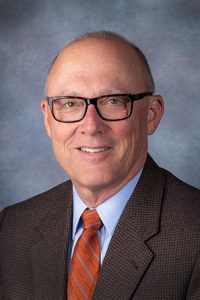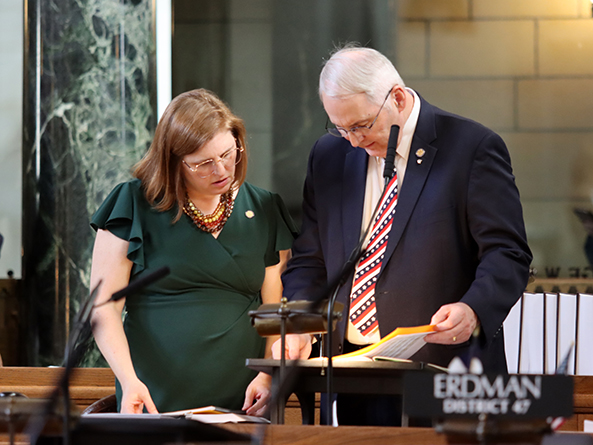Budget advances with minor adjustments, more changes likely
Lawmakers advanced two bills this week comprising the Appropriations Committee’s mid-biennium budget adjustment package as several senators indicated that substantive amendments will be offered on the next round of debate.

The state budget is structured on a two-year basis, with the budget enacted during legislative sessions held in odd-numbered years. Adjustments are made during sessions held in even-numbered years.
The committee’s proposed adjustments to the state’s $10 billion budget would result in a $904 million balance in the state’s Cash Reserve Fund, also known as the “rainy day” fund. The proposal reflects a 3.1% increase in state spending and would leave approximately $23 million to fund legislative proposals this year.
Debate focused on proposed transfers from a number of state agency cash funds.
Cash transfers
LB1413, introduced by Speaker John Arch of La Vista at the request of Gov. Jim Pillen, would provide for the transfer of funds and create and change the use and distribution of funds.
The governor’s proposal called for a sweep of funds from 31 different agencies, transferring those dollars to the state General Fund. At the bill’s public hearing, the state budget director described this as an attempt to “kick start” the revenue necessary to provide a 40% reduction in property taxes.
An Appropriations Committee amendment, adopted 39-1, replaced the bill. The amendment would make a number of changes to various fund transfers, including increasing by $10 million a proposed $60 million transfer from the State Unemployment Insurance Trust Fund, known as SUIT.
Committee chairperson Sen. Robert Clements of Elmwood said 11 transfers from Pillen’s original request ultimately were deemed “not appropriate” by the committee and were not included in the adjustment package, including transfers from funds with federal restrictions on their use.
Clements said the transfers outlined in the amendment, totaling $244 million, would help fund the state’s budget for the next two years while also bolstering the rainy day fund. The Cash Reserve Fund balance at the end of the biennium would be 16.6% of annual expenses, which he said is the committee’s target funding level.
“I’m pleased to say that the cash reserve is fully funded,” Clements said. “Some people have been concerned about revenues falling, but the forecasting board – for the next two years – is still optimistic.”
Omaha Sen. Christy Armendariz supported LB1413 and the committee amendment. State agencies assured committee members that transfers from the various cash funds would not jeopardize their ability to carry out necessary functions, she said, and cash funds should not be used as savings accounts. If agencies don’t need the funds to do their jobs, she said, those dollars should be used for other state purposes.
“I think it’s irresponsible for us to hold this money for a rainy day when I don’t believe taxpayers had that intent,” Armendariz said.
Sen. Machaela Cavanaugh of Omaha questioned whether sweeping those funds was the solution. If state agency cash funds consistently have high balances, lawmakers should be asking why that is the case, she said.
Sometimes entities don’t take advantage of funds because they don’t know they exist, Cavanaugh said, or agencies may not be maximizing the services that they provide.
“These cash funds were created for reasons and taking the funds out of them for a one-time sweep just doesn’t sit well with me,” she said. “Whether they are over-funded because we are charging too much in fees or taxes, or they’re underutilized, that’s something that we need to be examining, not just taking the money away.”
Lincoln Sen. Danielle Conrad offered an amendment during debate March 14 to strike the $70 million transfer from the State Unemployment Insurance Trust Fund. She said the SUIT fund was created by the Legislature in 1994 to serve as the state’s rainy day fund should the federal government ever not be able to provide for unemployment benefits.
Conrad said the legislative record and state law make clear that the fund, which is paid for by a tax levied on employers, is to be used only for unemployment benefits and job training programs – not as a way to balance the state’s budget or to provide property tax relief.
Supporting the amendment was Elkhorn Sen. R. Brad von Gillern, who said lawmakers should return SUIT funds to employers if those dollars aren’t needed instead of sweeping the fund for other purposes.
“As an employer, I’ve paid into this fund for 30 years,” he said.
Clements opposed the amendment. He said the fund hasn’t been used since it was created and that the $70 million transfer would leave $22 million in the fund, which he said grows by approximately $2.5 million per year.
The amendment failed on a vote of 20-20. Twenty-five votes were needed. A motion to reconsider that vote by Ralston Sen. Merv Riepe was later withdrawn. Supporters indicated that negotiations were ongoing and that a similar amendment likely would be filed on the next round of debate.
An amendment offered by North Platte Sen. Mike Jacobson, adopted 43-0, would remove from the committee amendment a proposed one-time $5 million transfer from the State Visitors Promotion Fund to the state Department of Economic Development for a statewide marketing campaign supported by the governor.
Jacobson said the funds, which come from the state lodging excise tax, are needed by the Tourism Commission for a variety of marketing campaigns to promote a new state slogan.
“We should not be taking tourism dollars to fund business recruitment,” he said.
Another amendment, offered by Cavanaugh and adopted 30-12, would change a proposed permanent transfer of interest earned on the Universal Service Fund — minus any amount transferred to the 211 Cash Fund — to the state’s General Fund. The amendment instead would make it a one-time transfer in FY2024-25 of $11.2 million in interest.
Plymouth Sen. Tom Brandt supported the amendment. Interest on the fund will be needed in the future to support broadband infrastructure once it is built out statewide in the coming years, he said, which is the reason the USF exists.
In addition to those changes, the following bills were included in the LB1413 committee amendment:
• LB975, introduced by Sumner Sen. Teresa Ibach, which would amend the Shovel-Ready Capital Recovery and Investment Act to include an additional type of qualified nonprofit;
• LB1233, sponsored by Sen. Justin Wayne of Omaha, which would authorize the Game and Parks Commission to award a grant to a federally recognized Indian tribe to construct, develop and manage a museum honoring Chief Standing Bear and transfer $15.75 million from interest earned on the Perkins County Canal Project Fund to fund the grant;
• LB1245, introduced by Omaha Sen. Mike McDonnell, which would amend provisions related to the Lead Service Line Cash Fund to define terms;
• LB1333, sponsored by Sen. Tony Vargas of Omaha, which would amend the Business Innovation Act to identify two types of planning grants;
• LB1352, introduced by Bennington Sen. Wendy DeBoer, which would authorize the state Auditor of Public Accounts to exercise exclusive authority to conduct the Statewide Single Audit for Federal Funds, including ARPA funds; and
• LB1407, sponsored by Sen. Rita Sanders of Bellevue, which would rename the Military Base Development and Support Fund to the Military Installation Development and Support Fund and change permitted uses of the fund.
Lawmakers advanced LB1413 to select file March 14 on a vote of 37-5.
Mainline budget bill
LB1412, introduced by Arch at the request of the governor, is the mainline budget bill. The proposal would provide, change and eliminate appropriations for the operation of state government, postsecondary education, state aid, capital construction and federal funds allocated to the state from the federal American Rescue Plan Act of 2021.
Clements said the committee started with the governor’s recommendations and made minor adjustments based on information gleaned from agency heads and the public. In addition, he said, the committee held hearings on 59 bills introduced by senators that included $250 million of new general fund spending requests and approximately $108 million in federal ARPA requests.
The only significant changes from the governor’s original recommendation, Clements said, was a $30.1 million increase in funding for the state’s homestead exemption program over the biennium and a $94.1 million increase in Nebraska Tax Equity and Educational Opportunities Support Act, or TEEOSA, funding. He said a “recalculation” of the state school funding formula in January indicated the need for additional dollars.
Cavanaugh offered a series of motions to extend debate on the proposal. After eight hours of discussion over two days, Arch filed a motion to invoke cloture March 13, which ceases debate and forces a vote on the bill. The motion succeeded 38-4.
Lawmakers then voted 39-3 to adopt an Appropriations Committee amendment that incorporated the provisions of more than a dozen additional proposals, including:
• LB850, sponsored by Jacobson, which would clarify that $10 million in ARPA funds appropriated to the state Department of Economic Development for the Rural Workforce Housing Act may be used for other specific types of housing projects administered by the department;
• LB930, introduced by Omaha Sen. John Fredrickson, which would allow an existing $400,000 annual General Fund appropriation to the University of Nebraska to be used for youth rehabilitation and treatment centers and county correctional facility programs for students studying to become behavioral health professionals;
• LB941, sponsored by Sen. Myron Dorn of Adams, which would appropriate $1.5 million in federal ARPA funds in FY2023-24 to increase to $67 the daily reimbursement rate for Medicaid assisted-living facilities in rural parts of the state;
• LB1077, introduced by McDonnell, which would appropriate $900,000 in federal ARPA funds in FY2023-24 to the state Department of Labor for workforce development and career readiness grants;
• LB1209, sponsored by Sen. Carolyn Bosn of Lincoln, which would appropriate $2 million in ARPA funds in FY2023-24 to the state Department of Health and Human Services for a grant to a licensed and accredited residential child-caring agency in a primary class city;
• LB1210, introduced by Clements, which would appropriate $1.5 million from the Cash Reserve Fund to the Nebraska Capital Construction Fund for the 5th floor Capitol renovation; and
• LB1289, sponsored by Lincoln Sen. Eliot Bostar, which would appropriate $3 million in general funds in FY2024-25 for a grant to a municipal airport located in a primary class city.
Following adoption of the committee amendment, LB1412 advanced to select file on a 39-4 vote.


